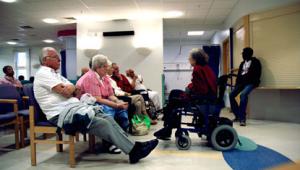08 December 2006
Inaccuracies in the way hospitals code the activities they perform in order to charge primary care trusts 'undermines' the new payment by results regime, the Audit Commission has warned.
Pilot studies across two health economies involving 12 acute trusts found that, on average, 12% of diagnosis and procedure codes were inaccurate, representing between 5% and 14% of total value of PbR transactions.
'The reported level of… error seems intuitively too high, particularly in a system where clinical coding is the primary determinant of payment,' says the December 7 report, Payment by results assurance framework.
'The level and nature of clinical coding error is not so high as to destabilise the PbR regime, but it does undermine it, raising concerns about the accuracy and fairness of funding flows.'
The report found evidence of 'over-coding' – logging more procedures than actually carried out and of 'trusts actively working to optimise their coding to maximise income.'
But Audit Commission head of health audit Andy McKeon told Public Finance they found 'no evidence of fraud or manipulation.' Income maximisation was within existing rules and some over-coding practice pre-dated PbR and so could not be attributed purely to the new financial incentive.
The report was commissioned by the Department of Health to ascertain whether a systematic audit process for assuring the accuracy of PbR bills was necessary. The Commission's pilot studies found that they were and they have now accepted a request from the DoH to roll out systematic annual PbR audits across all English NHS trusts later this year.
Of the 12 trusts examined in the study, coding inaccuracies led to seven being underpaid a total of £21,453 and five being overpaid a total of £59,922. But McKeon told PF that the financial impact had been skewed by one trust whose overpayments accounted for £44,450 of the total overpayments.
'The errors did not lead to systematic overpayment. More trusts were underpaid than overpaid, it just happened that in one trust there was a substantial overpayment,' he said, adding that, in many cases, under and overpayments tended to cancel each other out.
The DoH forecasts that £22bn worth of NHS activity will be subject to the PbR tariff this year, but McKeon said it would be wrong to extrapolate the 5-14% financial error rate found in the pilots across the entire NHS as the sample size was too small.
'We only examined 12 trusts so it's not a statistically valid sample of the NHS,' he said. 'That's not what we were looking to do. We were looking to develop a framework and methodology for identifying errors in the future.'
The framework will involve a using national data to identifying trends and spot unusual coding patterns in individual trusts, which will then trigger a more in-depth investigation. Trusts will not need to produce any new data but there will be pressure to improve the accuracy of their coding. Audit costs have yet to be finalised but are expected to be in the region of £30,000 for each PCT.
The report found that trusts with the fewest mistakes were those with more coders and better clinical engagement. A typical error involved an emergency admission where only the original – and not the final and accurate – diagnosis was recorded. But McKeon disagreed that clinical incentives needed realigning. PbR already contained the incentive to better record and recoup costs; clinicians and managers just needed to appreciate that better, he said.
PFdec2006




















